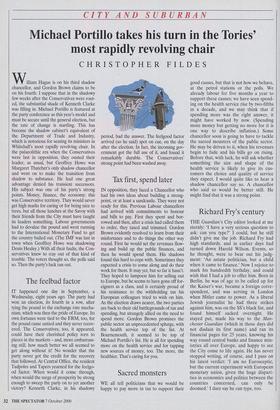The feelbad factor
IT happened one day in September, a Wednesday, eight years ago. The party had won an election, its fourth in a row, after tying the pound to the exchange rate mecha- nism, which was then the pride of Europe. Its own fortunes were tied to the ERM, too, for the pound came untied and they never recov- ered. The Conservatives, too, it appeared, could have their cherished policy torn to pieces in the markets — and, more embarrass- ing still, how much better we all seemed to get along without it! No wonder that the party never got the credit for the recovery that followed. At Central Office, the resident Tadpoles and Tapers yearned for the feelgo- od factor. When would it come through, when would the surge of prosperity be strong enough to sweep the party on to yet another victory? Kenneth Clarke, in his shadowy period, had the answer. The feelgood factor arrived (so he said) spot on cue, on the day after the election. In fact, the incoming gov- ernment got the full use of it, and found it remarkably durable. The Conservatives' strong point had been washed away.


















































































 Previous page
Previous page